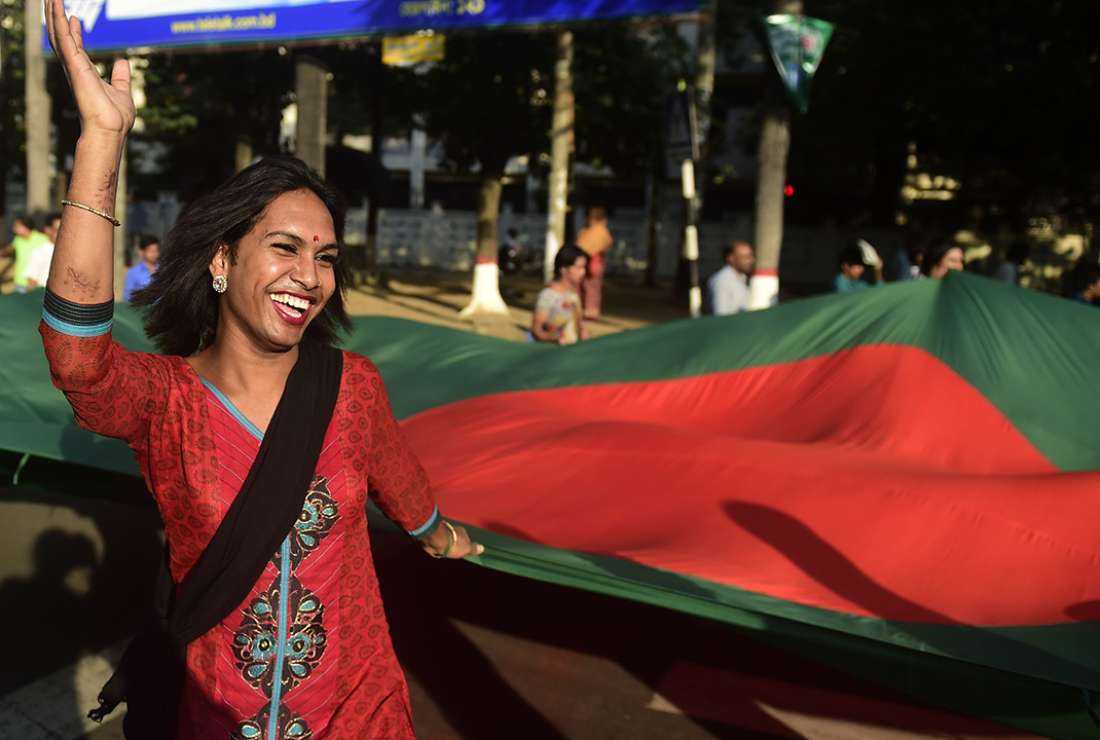Use of religion in politics and drifting away from secular and democratic principles fuel intolerance, observers say

A transgender person marches on a street in Bangladesh holding the national flag. (File photo: AFP)
A leading Bangladeshi private university drew a public and media backlash after it dropped a prominent transgender activist from a list of speakers during a women’s career carnival last month due to protests from a group of conservative teachers and students.
The decision by Dhaka-based North South University to drop Ho Chi Minh Islam from the event on its campus on Nov. 24 is another example of an increasingly radicalized society in Muslim-majority Bangladesh, critics say.
The closed Facebook group — Islamic Practitioner of NSU — claimed Islam’s promotion of gender identity and equality was un-Islamic and against the law. The protesters cited the controversial Section 377 of the British-colonial Penal Code that criminalizes any sexual behavior “against the order of nature.”
The hardliners cited the law to defend their stance even though the Bangladesh government recognized transgender people, locally known as hijra as the third gender in 2013.
The NSU Islam Practitioners argued that letting Islam speak would propagate and promote homosexuality, identifying her as a “biological male who surgically altered himself by inserting certain artificial implants to make himself look like a woman.”
“I have survived in this society just by chance. I was supposed to have been dead by now”
Islam also reportedly received numerous derogatory remarks and death threats on her social media.
Some reminded her about the fate of atheist bloggers and LGBT rights promoters Ahmed Rajib Haider, Xulhaaz Mannan, Abhijit Roy, and Washiqur Rahman Babu, who were brutally murdered by Islamist militants between 2013 and 2016 amid a rise in Islamic fanaticism.
“I have survived in this society just by chance. I was supposed to have been dead by now,” Islam said.
However, except for Facebook posts and statements given by a handful of privileged members of society, such as celebrities and a few progressive socio-political organizations, Islam was left alone to fight for herself.
“I’m feeling disgusted. This is my country. I was born and raised on this soil. Why do I have to endure this just because of a different gender identity?” she wrote on Facebook after her talk at the NSU was canceled.
Islam said she did not think of seeking police help as she has always been alone in her activism.
“I am used to being abandoned by my society to deal with its many problems,” she said.
Chhatra Union, a left-wing student organization slammed the NSU for dropping Islam and claimed it was another example of how the largest private university has been harboring and promoting radicalism.
“The university has turned into a factory producing militants instead of promoting scientific thought,” it said.
“My journey was a horrible one, always treated by society as an untouchable”
The NSU drew public ire after it was revealed two of the five militants in Bangladesh’s worst terror attack on a Dhaka café in 2016 were students at the university.
Earlier, it made headlines after seven students were convicted for murdering atheist blogger and secular activist, Ahmed Rajib Haider, in 2013.
Born in a small town in northern Bogura district, Islam became a nationally recognized nurse and the first transgender person to obtain a master’s degree in Bangladesh.
“But my journey was a horrible one, always treated by society as an untouchable,” she said.
As a member of a sexual minority, Islam said she could have felt better if religious and ethnic minority leaders voiced support for her, but were instead mostly silent.
She warned minority leaders about their silence, saying that their gradual elimination was imminent if they did not have each others’ back.
When asked about their silence, minority leaders said they were either not aware of what happened to Islam or refused to speak on the matter at all.
“We tend not to get involved in matters which our society ignores or remains silent about,” said Rana Dasgupta, secretary of the Bangladesh Hindu Buddhist Christian Unity Council.
The stance is due to limiting their activism on rights of religious and ethnic minorities, said Dasgupta, a Hindu.
The use of religion, particularly Islam, in politics and the gradual drifting away from secular and democratic principles are among factors fueling radicalism and intolerance in the county, he said.
“Culture and religious practices in South Asia do not accept homosexuality and sexual re-conditioning”
“As long as religion dictates politics and state operations, nobody will speak about issues such as transgender rights — neither political forces nor governments,” he added.
Political Islam was revived in Bangladesh in 1975, four years after the country won independence from Pakistan after a brief, bitter war. Two military regimes until the 1990s erased the key principle of secularism from the constitution and made Islam the state religion.
Radical Islam also crept in through millions of poor Bangladeshi migrants employed in petro-dollar-rich extremist Wahhabi Persian Gulf states, observers say.
This slow but steady Islamization continued despite the nation’s constitution barring any kind of discrimination on grounds of religion, race, caste, sex or place of birth.
While the Penal Code bans homosexuality, Bangladeshi society at large has been against it.
Religious leaders say culture and religious practices in South Asia do not accept homosexuality and sexual re-conditioning.
Father Bidya Barman, a Catholic priest from northern Dinajpur diocese, said the Church does not approve of artificial sex change because it is against the order of nature.
Nirmol Rozario, president of the Bangladesh Christian Association, said Christianity stands for equality of all people. However, he refused to comment on the Ho Chi Minh Islam incident.
“Buddhism views all human beings equal and without any distinction,” said Bangladesh Buddhist Federation secretary, Sunandapriya Bhikkhu. He also declined to comment further like Rozario.
Illegal sexual relations are one of five activities banned in Buddhism, he explained.
“The definition of illegal is what is not accepted in society,” he said.
“What is annoying is the NSU authorities accepting this legal misinterpretation”’ said Supreme Court lawyer, Jyotirmoy Barua, a Buddhist.
Transgender people transition from one sex to another and have nothing to do with homosexuality, he said.
Despite the discrimination and vilification of transgender people like her, Islam vows to battle for equality, saying her name denotes the rebellious spirit of the famed Vietnamese revolutionary, Ho Chi Minh.
“You see my name. It was given by my father,” Islam said.

